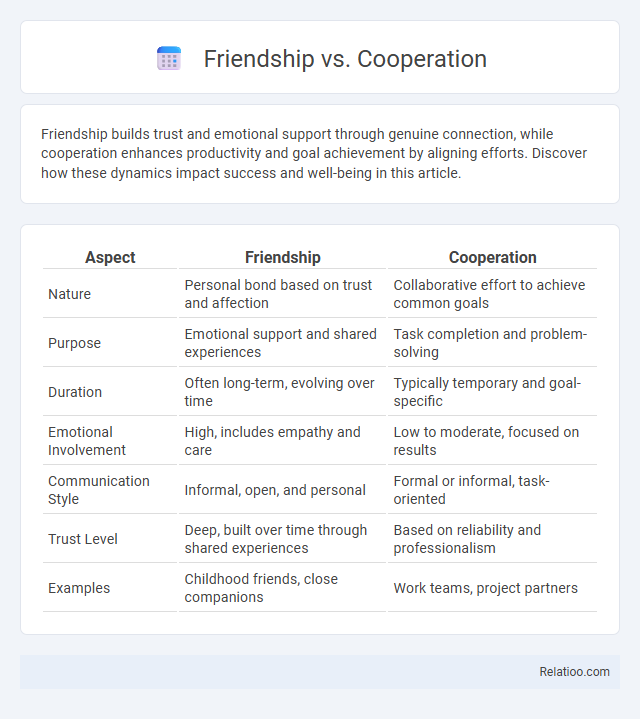Friendship builds trust and emotional support through genuine connection, while cooperation enhances productivity and goal achievement by aligning efforts. Discover how these dynamics impact success and well-being in this article.
Table of Comparison
| Aspect | Friendship | Cooperation |
|---|---|---|
| Nature | Personal bond based on trust and affection | Collaborative effort to achieve common goals |
| Purpose | Emotional support and shared experiences | Task completion and problem-solving |
| Duration | Often long-term, evolving over time | Typically temporary and goal-specific |
| Emotional Involvement | High, includes empathy and care | Low to moderate, focused on results |
| Communication Style | Informal, open, and personal | Formal or informal, task-oriented |
| Trust Level | Deep, built over time through shared experiences | Based on reliability and professionalism |
| Examples | Childhood friends, close companions | Work teams, project partners |
Understanding the Concepts: Friendship vs Cooperation
Friendship involves a deep emotional bond characterized by trust, empathy, and mutual support, while cooperation focuses on collaborative efforts aimed at achieving shared goals without necessarily involving emotional connections. Understanding the distinction between friendship and cooperation is crucial in social dynamics, as friendships often enhance cooperation through stronger motivation and commitment. These concepts interplay significantly in evolutionary biology, where both friendship and cooperation contribute to survival and social bonding across species.
Key Differences Between Friendship and Cooperation
Friendship centers on emotional bonds, trust, and mutual support, while cooperation involves working together toward shared goals often without personal attachment. Your relationships are driven by feelings and long-term connection in friendship, whereas cooperation depends on coordinated efforts and task-oriented interactions. Evolution influences both by shaping social behaviors that enhance survival and group success.
The Role of Trust in Friendship and Cooperation
Trust serves as the foundational element in both friendship and cooperation, enabling individuals to reliably share resources, ideas, and support without fear of betrayal. In friendships, trust fosters emotional bonds and mutual understanding, while in cooperative ventures, it ensures coordinated efforts toward common goals and reduces transaction costs. Evolutionarily, the development of trust mechanisms enhances group survival by promoting collaborative behaviors and strengthening social cohesion.
Emotional vs Practical Bonds
Friendship fosters deep emotional bonds through trust, empathy, and shared experiences, creating strong interpersonal connections. Cooperation emphasizes practical bonds, enabling individuals or groups to work together efficiently toward common goals, often driven by mutual benefit rather than emotional attachment. Evolution combines both emotional and practical bonds, as social behaviors that enhance survival and reproduction are naturally selected, promoting cooperation within emotionally connected groups to adapt and thrive.
Communication Styles in Friendship and Cooperation
Friendship communication styles emphasize emotional openness, trust, and informal exchanges that strengthen personal bonds, while cooperation relies on clear, goal-oriented dialogue and structured interactions to achieve shared objectives efficiently. Effective cooperation requires active listening, concise messaging, and conflict resolution skills, ensuring tasks progress smoothly. Both styles evolve with context, balancing relational depth in friendship and task precision in cooperation to foster mutual understanding and productivity.
Mutual Benefit: Altruism vs Utility
Friendship fosters mutual benefit through altruism, where emotional support and trust cultivate long-lasting bonds without expecting immediate returns. Cooperation emphasizes utility by enabling individuals or groups to achieve common goals efficiently, optimizing resource sharing and task coordination for collective success. Evolution favors strategies balancing altruism and utility, ensuring species survival through behaviors that promote both individual fitness and group advantage.
Conflict Resolution: Friends vs Collaborators
Friendship fosters trust and emotional support, which can ease conflict resolution by prioritizing understanding and empathy in disagreements. Cooperation emphasizes shared goals and structured communication, enabling collaborators to resolve conflicts through clear negotiation and mutual benefits. Your success in managing conflicts hinges on balancing the emotional bonds of friendship with the strategic frameworks of collaboration for effective, long-term evolution in relationships.
Limits and Boundaries in Each Relationship
Friendship fosters emotional support but faces limits in trust and personal boundaries, requiring careful respect of individual differences. Cooperation is goal-oriented, demanding clear roles and mutual accountability while avoiding overdependence that can hinder progress. Evolution within relationships necessitates adaptability and growth, yet pushing too far risks destabilizing established dynamics, so Your awareness of these boundaries is crucial for balanced development.
Impact on Personal and Professional Life
Friendship fosters emotional support and trust, enhancing your personal well-being and strengthening teamwork in professional settings. Cooperation drives collective problem-solving and productivity, leading to effective goal achievement and improved workplace relationships. Evolution, through continuous learning and adaptation, empowers personal growth and career advancement by embracing change and innovation.
Choosing Between Friendship and Cooperation
Choosing between friendship and cooperation depends on long-term goals and mutual benefit; friendship fosters trust and emotional bonds often leading to more resilient partnerships, while cooperation emphasizes strategic collaboration aimed at achieving specific objectives. In evolutionary biology, cooperative behaviors often enhance survival through reciprocal altruism, but friendships can provide stability and social support that facilitate group cohesion and adaptability. Balancing both requires assessing contextual needs--friendship for sustained, trust-based interactions and cooperation for pragmatic, goal-oriented tasks.

Infographic: Friendship vs Cooperation
 relatioo.com
relatioo.com